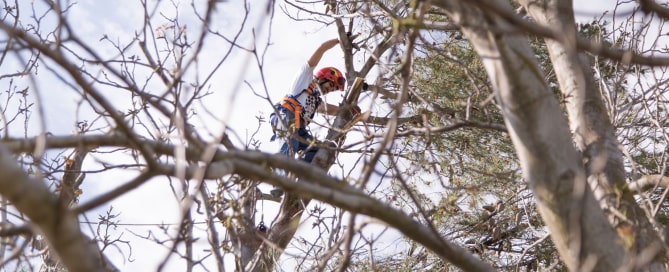It usually happens while walking through the yard one day – you notice leafless limbs or dead branches lying on the ground. But how do you know when a tree needs a good pruning or when it should be removed?
In this article, we’ll explain when a tree is considered a safety hazard and when it just needs a good, healthy trim.
Signs Your Tree Needs Pruning
Tree Pruning is essential for the healthy maintenance of trees, but improper pruning can cause damage and in some cases the tree’s death. That’s why trees should only be pruned by Certified Tree Care Safety Professionals, like the experts at Friendly Tree, who practice safe, proven and effective methods.
Damaged, Diseased or Dead Branches
Besides the danger of falling, broken or damaged limbs can serve as an entry point for insects and disease. In general, a tree has a good chance of survival if less than 25% of its branches are damaged.
Dense Canopy
A tree canopy that is too dense is a problem, as restricted sunlight and airflow can lead to disease.
Undesirable Branches
Sometimes, weak or troublesome limbs must be removed in order to benefit the health of the entire tree. Suckers and water sprouts steal a tree’s resources and should be removed. Crossing branches can damage each other and should also be pruned. Co-dominant leaders (two branches of similar size growing up from the top of the tree) are prone to splitting and tearing during strong winds. Eliminating one of these branches provides the tree with more stability.
Weak or Split Crotch
As a tree ages, its crotch (where two branches come together) may grow weak and split apart; removing split crotches helps keep the tree healthy and strong.
Approaching Power Lines or Structures
A more obvious reason for pruning is a tree’s proximity to power lines or other structures. Unfortunately, people sometimes plant trees under power lines not knowing how tall they will get at maturity. Be sure to hire a professional for these kinds of jobs, as there is significant risk to people and property if the job is not done correctly.
The best time to prune your trees is when they are dormant in late winter or early spring, which encourages healthy spring growth. Dead, damaged or hazardous branches should be trimmed as soon as possible.
Signs Your Tree Should be Removed
Not all dead or dying trees need to be removed. Those that don’t pose a risk to people or structures can be left alone and serve the neighborhood birds as a shelter and food source. Here’s how to tell when tree removal is necessary:
Large Number of Dead or Damaged Limbs
If 50% or more of the tree is damaged, and falling limbs pose a hazard, it’s time to say goodbye. If the dead branches are all on one side of the tree, it’s typically a sign of root or trunk problems and the tree should be evaluated by one of our arborists.
Severe Trunk Damage
Severe damage to the tree’s main trunk (more than 25% of the trunk’s circumference), including large cracks and seams, indicate decay.
Hollow Trunk
A tree can live for many years with a hollow trunk, but it will eventually come down. If a third of the trunk is hollow (or rotted), consult an arborist about getting it removed.
Root Damage or Weakness
It may be hard to tell if a tree has substantial root damage, but if the ground nearby has been excavated or you suspect any damage to the root system, consider removing the tree. Also look for trees with shallow root systems as a result of their growing environment. Trees near ledges, large rocks or right next to a water source often have shallow roots.
Leaning
If your tree is suddenly leaning in one direction, it could mean root damage or weakening. A tree that is noticeably leaning in any direction is unsafe and should probably be removed.
Need help determining if your tree needs pruning or removal? Friendly Tree can help. For over 25 years we’ve been helping New Jersey residents with their tree care needs. Our certified arborists adhere to ANSI standards for tree care practices, with the expertise to help you assess what your trees need to stay happy and healthy.



Recent Comments